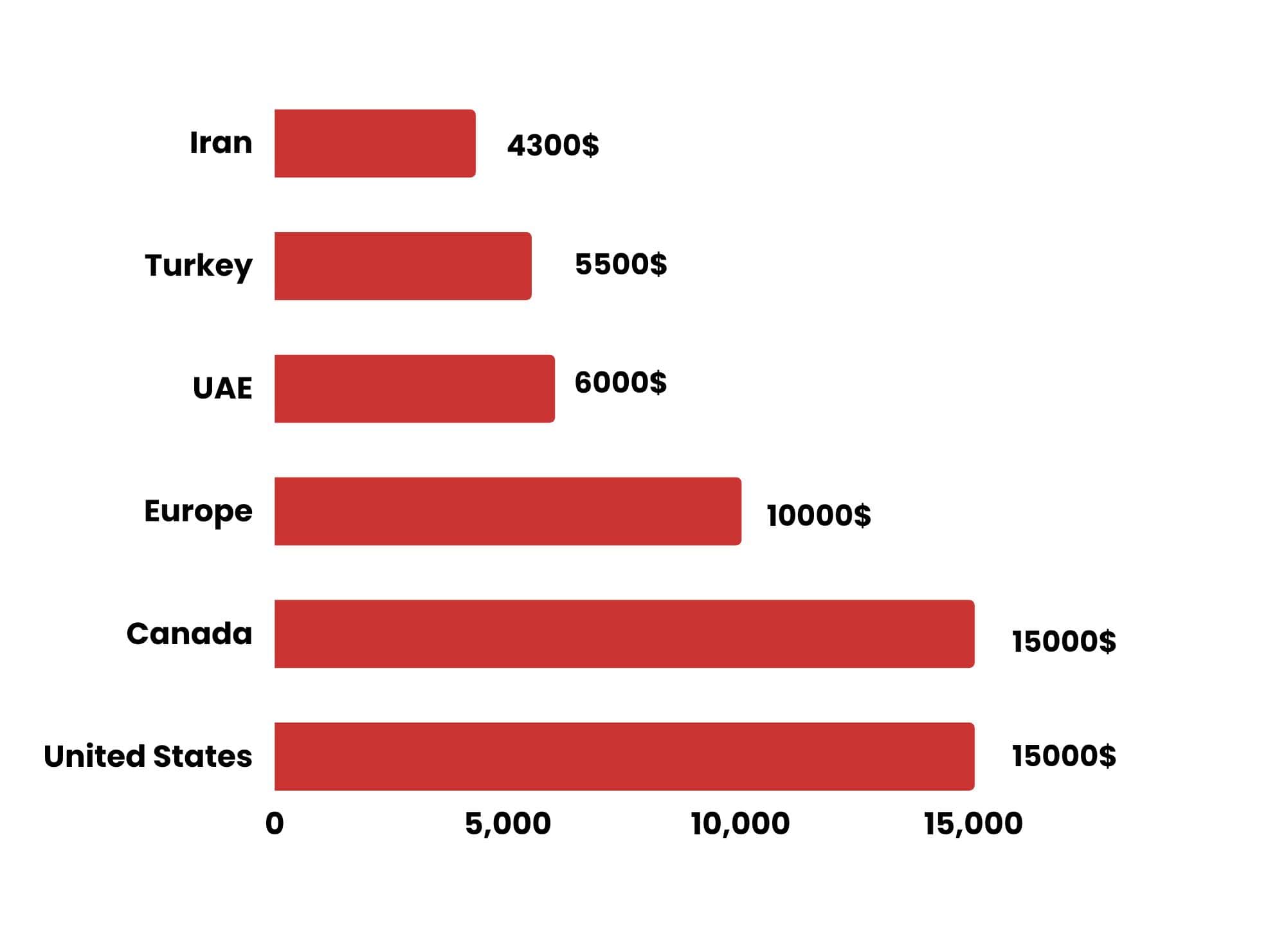Gastric Bypass in Iran

Gastric Bypass in Summary
Recovery Time
1-3 Months
Hospital Day
Surgery Duration
2-3 Hours
Anesthesia
Back to Work
2-3 Week
Stay in Iran
Why Should You Choose Iran for Gastric Bypass Surgery?
- Affordable Healthcare: The cost of Roux-en-Y in Iran is significantly lower than in countries such as the United States, Europe, or Turkey.
- Experienced Surgeons: At LyaMed, we have skilled and experienced surgeons who are trained in the best medical schools in the world.
- Modern Hospitals: Iran has modern healthcare facilities and well-equipped hospitals that meet international standards. Our hospitals have the most advanced medical technology and modern infrastructure available.
- Medical Tourism Support: Iran has been actively promoting medical tourism. If you choose LyaMed for your Roux-en-Y in Iran, we provide various support services in our packages for your convenience.
- Cultural and Historical Attractions: Iran has a rich history, culture, and natural beauty. You can choose Iran to explore its attractions during a fantastic trip.
- Quality of Care: While gastric bypass surgery cost in Iran is lower, we don’t compromise the quality of care. We provide excellent healthcare services for you to have a seamless medical and tourism experience.
PackagesGastric Bypass Packages in LyaMed
Economic
Gastric Bypass- 8 Nights at 3*Hotel
- Welcome Dinner
- Half-day Sightseeing
- Medical Imaging & Tests
- Visa
- Transportation
- 24/7 Interpreter
- Follow Up
- SIM Card & Internet
Special
Gastric Bypass- 8 Nights at 4*Hotel
- Welcome Dinner
- Half-day Sightseeing
- Medical Imaging & Tests
- Visa
- Transportation
- 24/7 Interpreter
- Follow Up
- SIM Card & Internet
VIP
Gastric Bypass- 8 Nights at 5*Hotel
- Welcome Dinner
- Half-day Sightseeing
- Medical Imaging & Tests
- Visa
- Transportation
- 24/7 Interpreter
- Follow Up
- SIM Card & Internet
PricingGastric Bypass Cost in Iran
Our lower cost for gastric bypass packages in Iran has many reasons, such as:
- Cost-effective surgeon fees
- Lower hospital expenses
- Affordable medical testing and medicine
- The lower exchange rate between US Dollars and Iranian Rials
Also, your general expenses, such as accommodation, sightseeing, and transportation, are included in your gastric bypass packages.
What is Gastric Bypass?
Gastric bypass is a weight-loss surgery that assists you in losing weight by reducing your stomach food capacity.
Your surgeon should decide about it after reviewing your medical tests. For example, your surgeon may suggest opting for liposuction 360 in Iran instead of gastric bypass if your only concern is losing excess fat.
Gastric bypass limits the amount of food your stomach can hold. This restriction results in a decreased absorption of calories and nutrients by your body.
Gastric Bypass Surgery Phases
Gastric bypass involves 2 major phases:
- The first phase is creating a pouch (in the upper part of your stomach) that has a small volume so you feel fullness faster with much less amount of food.
- The second phase is called bypass, which is adjusting your digestive system by attaching your small intestine (jejunum) to your pouch.
How Do I Know If I Need a Gastric Bypass?
If you fail to lose weight through diet and exercise, you might be a good candidate for Roux-en-Y gastric bypass (RYGB).
Also, if your surgeon notices that you might be in great danger if you do not lose weight, he may suggest Roux-en-Y surgery. The symptoms that can lead to such a decision are:
- Heart-related diseases such as stroke
- Blood-related issues like hypertension and high cholesterol
- Diabetes (Type 2)
- Cancer
- Infertility
This surgery needs extensive lifestyle changes afterward, and you must be physically and mentally ready for gastric bypass.
How many years does gastric bypass last?
Gastric bypass helps to achieve a permanent reduction in the capacity of your stomach and rerouting your digestive system. This surgical procedure is designed to facilitate long-term weight loss.
What are the Different Types of Gastric Bypass?
Gastric bypass surgery has various methods that our surgeon may choose based on your specific needs and medical condition.
Proximal Roux-en-Y Gastric Bypass
During proximal RYGB, a segment of the small intestine below the lower stomach outlet is divided and rearranged to form a Y-shaped configuration.
This reconfiguration allows food to exit the small upper stomach pouch through what is known as the “Roux limb“.
Importantly, in the proximal version of RYGB, the Y-intersection is created near the proximal part of the small intestine.
By using part of your small intestine to construct the Roux limb, the majority of your small intestine remains unaltered and absorbs nutrients.
Distal Roux-en-Y Gastric Bypass
The distal Roux-en-Y involves reconfiguring the small intestine to promote weight loss. In this surgery, the Y-shaped connection is created closer to the lower end of the small intestine.
This positioning reduces the absorption of nutrients, especially fats, starches, minerals, and fat-soluble vitamins.
Generally, the distal RYGB offers a relatively slight increase in total weight loss compared to other methods.
Mini-gastric bypass (MGB)
The mini gastric bypass, or MGB, is a kind of bypass surgery that involves creating a long, narrow tube from your stomach’s right side. Additionally, a portion of your small intestine is looped up and attached to this tube.
One significant advantage of the mini gastric bypass is its lower risk of bile reflux. This procedure is gaining popularity as an alternative to the traditional RYGB due to its simpler construction and reduced risk of complications.
Endoscopic duodenal-jejunal bypass
It involves the placement of a duodenal-jejunal bypass liner between the beginning of the duodenum and the mid-jejunum.
This liner acts to prevent partially digested food from entering the initial section of the second part of the small intestine.
This method is an effective way to improve weight loss and glucose control.
All of the above methods are practical solutions for losing weight. Yet, you might not need any of the mentioned methods.
If you just want to have a well-shaped body, consider BBL in Iran.
What are the Pre-Surgical Instructions for Gastric Bypass?
Some of these pre-surgical tasks are like sleeve gastrectomy in Iran. Before any bariatric surgery, you must visit a dietitian or nutritionist to monitor your current dietary habits and nutritional status. It is necessary to plan for dietary changes after surgery.
It is better to make some lifestyle changes before surgery, such as adopting a healthier diet, exercising, losing weight if possible, and stopping smoking.
You must inform your surgeon about all medications you are taking. Your surgeon may suggest adjusting or discontinuing the consumption of some medicines before surgery.
Your surgeon will provide specific fasting instructions, and on the day before surgery, you should fast.
What Happens During the Gastric Bypass Surgery?
Our surgeon, based on your medical condition, creates a surgical plan. He chooses to use either the open or laparoscopic gastric bypass.
- The first step is general anesthesia.
- The surgery begins with cutting the upper part of your stomach and creating a small pouch (the size of a walnut or an egg).
- After that, our surgeon attaches a part of your lower small intestine to your pouch. This causes your food to go straight forward from your stomach pouch to the lower part of the small intestine.
- Our surgeon reconnects the upper branch of your small intestine to a lower point in the intestine.
Risks and Side Effects of Gastric Bypass
Generally, the risks and side effects of gastric bypass surgery are categorized into short-term and long-term risks.
The short-term risks include:
- Bleeding
- Infection
- Blood clots
- Leaks in your gastrointestinal system
The long-term risks include:
- Hypoglycemia
- Dumping Syndrome (May cause symptoms such as diarrhea, nausea, or vomiting)
- Malabsorption
- Stomach Perforation
- malnutrition
- Bile reflux
- Vomiting
- Gallstones
- Ulcers
- Weight Regain
If you experienced weight regain or failed to lose enough weight, there’s some alternative surgeries such as gastric bypass revision and lap band revision. This surgery helps you to lose weight after the first surgery.
What Happens During Recovery Time?
Gastric bypass is an inpatient surgery, and you will rest in the hospital after surgery for 1 day. During the initial days, you may experience some pain that can be controlled by pain medicine through intravenous therapy. After that, you will need to recover for about 2 – 3 weeks before continuing your routine activities, such as going to work.
You should avoid extreme physical activities and exercise for up to 6 weeks.
It may take about 3 months to recover from surgery completely.
During your recovery process, you will have many diet restrictions. You will gradually progress from a liquid to solid food.
- Following the surgery, you will initially be limited to consuming liquid foods.
- Then, you can eat soft foods.
- After that, you can eat more solid foods.
- Also, the role of using vitamins and mineral supplements is important at this time due to your dietary restrictions.
During recovery time after Roux-en-Y, your body will undergo significant changes. You may experience fatigue, body aches, feeling cold, dry skin, mood swings, and hair problems such as hair loss and thinning.
How is Gastric Bypass Surgery Performed in Iran? – A Step-by-Step Guide
When you opt for Gastric Bypass in Iran, we provide everything you need for this surgery. Our services include:
- Online Consultation & Travel Planning
- Medical Visa Assistance
- Accommodation
- Full-Service Transportation
- Hospital
- Treatment
- Recovery
- Sightseeing
- Online Follow-Up
Where Can I Opt for a Gastric Bypass in Iran?
When considering gastric bypass surgery in Iran, look no further than LyaMed! We are your premier partner for achieving your weight loss goals.
Our gastric bypass surgery package costs in Iran are competitive and much lower than other medical tourism companies.
Contact us to book your consultation and start your path to a healthy life.
Frequently Asked Questions About Gastric Bypass in Iran
What is gastric bypass?
How much does gastric bypass surgery cost in Iran?
Which country is best for gastric surgery?
- Iran
- USA
- Thailand
- Turkey
- India
Is gastric surgery safe in Iran?
What are the short-term side effects of gastric bypass?
- Bleeding
- Infection
- Blood clots
- Leaks in your gastrointestinal system
What are the long-term complications of gastric bypass?
- Hypoglycemia
- Dumping Syndrome
- Malabsorption
- Stomach Perforation
- malnutrition
Why is gastric bypass so cheap in Iran?
- Cost-effective surgeon fees
- Lower hospital expenses
- Affordable medical testing and medicine
- The lower exchange rate between US Dollars and Iranian Rials


0 Comments